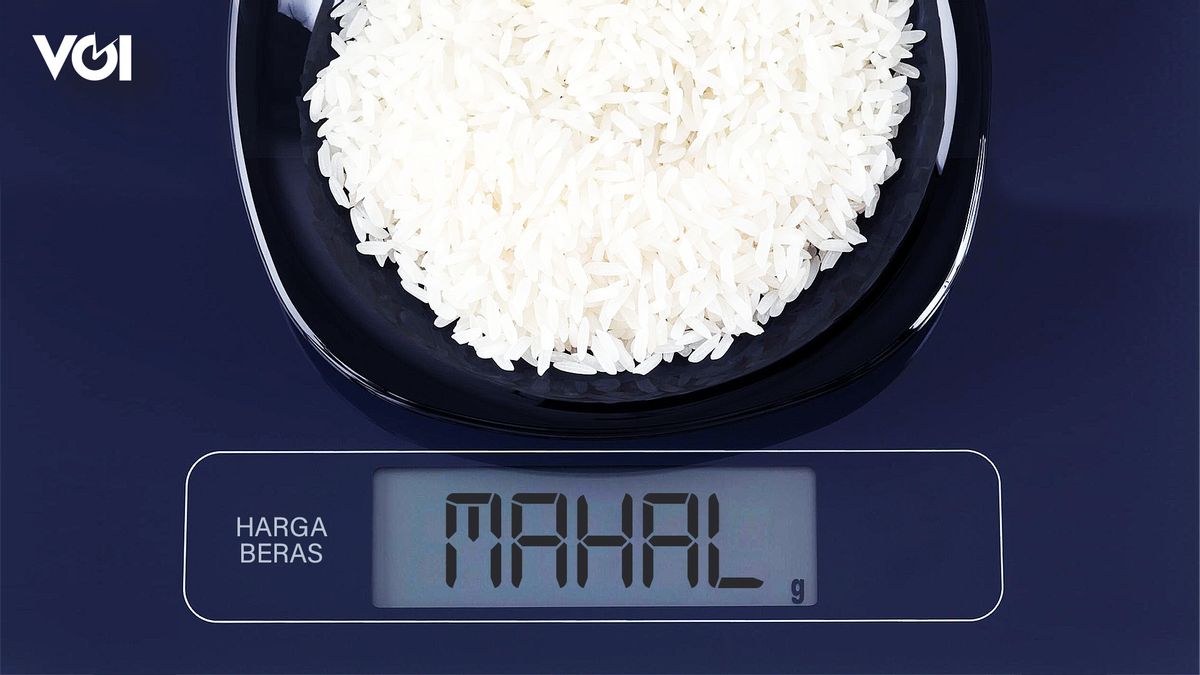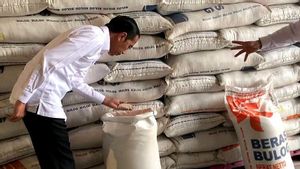JAKARTA If you haven't eaten rice, it means we haven't eaten yet. That's an expression or joke that illustrates that the majority of Indonesians use rice as their daily staple food.
Unfortunately, recently Indonesia, which (formerly) was famous for its gimah rahapahwi' which means "peace, prosperity and very fertile", has been hit by scarcity of rice. The stock that is empty and soaring rice prices is a bitter reality that must be faced by the community.
The government of President Joko Widodo is also involved in finding the cause of the scarcity of rice in the community. Minister of Trade (Mendag) Zulkifli Hasan revealed that one of the causes of scarcity and soaring rice prices in the market is the slow period of rice harvesting in the country so that the government must supply imported rice to the market so that the needs of the community are met.
"We are indeed slow to harvest the rice. Planting is slow, the harvest is slow. But the government has filled it with a lot of imports," he said.
However, in addition to trying to pour imported rice into the community, the government also wants to ensure that this rice import does not harm local farmers. "Now in farmers the price of rice is purchased for Rp. 11,000, the unhulled rice is very high. Now to overcome this high price, the government, Bulog supply to markets from 100,000 to 200,000 tons per month, now it is increased by 250,000 tons," added Zulhas.
He also stated that from inspections to several markets, the scarcity of rice in the market was also caused by traders who were reluctant to sell rice from Perum Bulog, which was considered to only generate a small profit for them. This is because the Stability of Food Price Supply (SPHP) rice from Bulog is priced at IDR 10,900 per kilogram in accordance with the highest retail price (HET) set.
"The reason yesterday in the market, market traders were a bit lazy to sell Bulog rice, the rice was good but the price was cheap because it was subsidized because the profit was only a little Rp. 200," said Zulhas.
The solution, the government provides incentives so that the profits for traders who sell SPHP rice are greater, which is Rp500. The hope is that traders are interested in selling more rice to the community.
In fact, Zulhas continued, traders can make even greater profits if they sell rice at retail sizes during the small rice packaging itself.
If it is sent in sacks, traders can pack themselves and get another Rp210. We want to make a profit of Rp500, so it can be Rp710, that's interesting. Hopefully, market traders will be interested in helping people who have difficulty because the price of rice goes up, there is good Bulog rice, the price is cheap because it is subsidized," he explained.
SEE ALSO:
Meanwhile, the Minister of Agriculture (Mentan), Andi Amran Sulaiman, ensured that the development of rice and corn production this year went very well. This is because the government has so far continued to irrigate rice fields on islands and outside Java by using water pumps.
As a result, the area of plants in December 2023 has exceeded the monthly target of 1.5 million hectares. This figure increased in the January 2024 planting season which reached 1.7 million hectares. In December (2023) we planted 1.5 million hectares, January (2024) 1.7 million hectares. If we want to meet the monthly needs, we will plant at least 1 million hectares per month," he said.
Increase Food Productivity By Pumping On Rawa Land
In addition to pumping, the government also continues to move quickly to optimize swampland to increase productivity. On the other hand, the Ministry of Agriculture also provides free seed incentives to farmers who want to expand.
The Minister of Agriculture also said that one way that will be taken to boost rice production is to increase the distribution of water to fields. The trick, by pumping water from rivers whose construction will be carried out by PUPR.
This is done to help increase production in a number of agricultural centers both on the island of Java and outside Java. That's what we are doing to increase production, the first is pumping where there are large rivers such as Bengawan Solo, Cimane and others. We install pumps to increase the water to the fields," he said.
The Minister of PUPR, Basuki Hadimuljono, added that his party is still waiting for agricultural location points to be supplied with water. After that, PUPR will look for the nearest water point. The main focus is targeting higher rice fields than irrigation routes. Through the pump earlier, water will be able to reach the rice fields, so productivity will increase.
In this Java area 500 thousand hectares of rice fields are irrigated, planting more efficiently more effectively, areas that are irrigation below, we pump the fields above. We pump 500 thousand in Java and outside Java 500 thousand," he said.
However, Basuki still cannot confirm when this program will start. However, the Ministry of PUPR has two target planting seasons, namely, the April-September and October-March planting seasons.
Imports Are Not A Solution To Suppress Soaring Prices
Rice commodities are part of season-based agricultural products so that ups and downs in prices can occur due to the planting season. The increase in rice prices at the beginning of the year is predicted to increase to be higher.
According to the Main Secretary of Bapanas, Sarwo Edhy, the plan to import rice from Thailand is to tackle the high price of these staples and even higher. This can be anticipated through Rakornas and ratas, of course with the approval of the president and minister. Last year 2.8 million tons, this year the plan is two million tons, but if for example domestic production is sufficient, it means imports are not finished," he added.
He considered that the high price of rice in the market in recent times was caused by the high cost of production, to the impact of El Nino 2023, which made the planting time back. First, indeed the production cost rose, the fertilizer rose, yesterday the impact of El Nino drought, then water was also lacking, the harvest was reduced, so the results decreased, automatically prices rose," explained Sarwo.
He also dismissed the assumption that the increase in rice prices was related to the time leading up to Ramadan. Sarwo said that this increase was indeed the impact of the receding rice planting time and El Nino.
In addition, Badanas denied allegations of rampant rice hoarding, causing prices to soar in the market. Sarwo hopes that with the steps taken by Bapanas and Bulog, the price of rice is expected to return to normal in the near future.
Responding to the chaotic rice that triggered scarcity and high prices, the Chairman of the National Executive Board of Women's Solidarity, Armayanti, also admitted that she felt the impact of the high price increase in rice even though it was a vital need for the community. According to Armayanti, the increase in rice prices occurred because there was a problem of shifting the planting period at the farmer level due to the climate crisis.
So that in addition to the reduced yield and soaring unhulled prices. The current impact of the climate crisis makes it difficult for farmers to predict the planting period. Long kemarau with a short rainy season, makes farmers not dare to start their planting period, the planting season is predicted to be March, it is also in preparation for land.
From the view of the Women's Solidarity, which since 1990, the threat of a food crisis has become their concern. Indeed, the climate crisis has become an obstacle to food security. But not only the issue of the climate crisis, but the problem of food security is also related to development which is only industrial-oriented, which ignores the security of local farmers themselves.
"For example, the development for infrastructure, such as toll roads that displace agricultural land, has cut off the role of local farmers. As a result, he (the farmer-ed) does not have the power to plant or care for food sovereignty itself. Including the problem of food estate failure, in Kalimantan, for example, the paradigm of government development which is only industrial-oriented," he said.
The English, Chinese, Japanese, Arabic, and French versions are automatically generated by the AI. So there may still be inaccuracies in translating, please always see Indonesian as our main language. (system supported by DigitalSiber.id)
















